
International Journal of Criminal Justice Sciences
Scope & Guideline
Championing rigorous scholarship in legal studies.
Introduction
Aims and Scopes
- Criminal Justice System Analysis:
The journal extensively covers the analysis of criminal justice systems, including law enforcement practices, judicial processes, and the impact of laws on society. This includes studies on the effectiveness of criminal justice policies and their implications for human rights. - Legal Reforms and Policy Evaluation:
It addresses the need for legal reforms and evaluates existing policies, particularly in response to emerging societal challenges such as human trafficking, online fraud, and environmental crimes. The focus is on how legal frameworks adapt to social changes. - Interdisciplinary Research:
The journal encourages interdisciplinary research that combines legal studies with insights from sociology, psychology, and technology. This includes the application of artificial intelligence in the judiciary and the socio-psychological factors affecting crime. - International and Comparative Law:
There is a strong emphasis on international and comparative law, exploring how different jurisdictions address similar criminal justice issues, including the examination of laws from various countries and their effectiveness. - Victimology and Restorative Justice:
Research on victimology, restorative justice practices, and the experiences of victims within the criminal justice system is a vital scope, focusing on rehabilitation and the societal reintegration of offenders. - Youth and Juvenile Justice:
The journal explores issues related to juvenile justice systems, including prevention strategies for youth delinquency and the role of community and familial contexts in shaping juvenile behavior.
Trending and Emerging
- Impact of Artificial Intelligence in Justice:
Research on the application of artificial intelligence within the judiciary and its implications for public trust and legal outcomes is gaining traction, highlighting the intersection of technology and law. - Restorative Justice Practices:
There is a notable increase in studies focusing on restorative justice and its effectiveness in rehabilitating offenders and addressing victims' needs, reflecting a growing preference for restorative over retributive approaches. - Youth Crime Prevention Strategies:
Emerging themes include innovative strategies for preventing youth crime, particularly in the context of community engagement and social support systems, indicating a shift towards proactive rather than reactive measures. - Cybercrime and Digital Fraud:
The rise of online fraud and cybercrime has led to increased research emphasis on understanding and combating these issues, demonstrating the need for updated legal frameworks and enforcement strategies. - Human Trafficking and Vulnerability:
Research focusing on the impact of human trafficking, particularly among vulnerable populations such as teenagers, is emerging as a critical area of study, reflecting heightened awareness and urgency in addressing this global issue.
Declining or Waning
- Traditional Law Enforcement Models:
There appears to be a waning interest in traditional models of law enforcement, as research increasingly shifts towards more innovative approaches, such as community policing and restorative justice, which prioritize rehabilitation over punitive measures. - Corruption and Governance Issues:
Although corruption remains a critical topic, the specific focus on governance issues related to corruption has diminished. This may indicate a shift towards more practical applications and preventative measures rather than theoretical discussions. - Crime Trends in Specific Regions:
Research focusing solely on crime trends in specific regions, particularly in isolation from broader contextual or comparative analyses, has become less prevalent. This suggests a move towards more integrative studies that consider multiple factors influencing crime. - Environmental Crime Legislation:
Interest in environmental crime legislation has decreased, possibly due to a greater emphasis on interdisciplinary approaches that integrate environmental issues with broader criminal justice and policy frameworks. - Theoretical Discussions on Punishment:
Theoretical discussions surrounding punishment, particularly retributive justice, have seen a decline as the focus shifts towards practical applications and alternatives such as restorative justice and rehabilitation.
Similar Journals
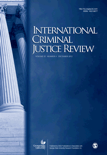
International Criminal Justice Review
Illuminating pathways in criminal justice scholarship.International Criminal Justice Review is a premier journal in the field of law, published by SAGE Publications Inc, renowned for its commitment to advancing the understanding of criminal justice issues on a global scale. With an ISSN of 1057-5677, this journal spans a rich history from its inception in 1991 to its ongoing contributions into 2024, supporting a diverse array of research that addresses both theoretical and practical concerns in international criminal law. The journal holds a prestigious Q1 ranking in the Law category for 2023, reflecting its influence and relevance, as evidenced by its impressive Scopus rank of #68 out of 1025 in the Social Sciences Law field, placing it in the 93rd percentile. Though not an open-access journal, it provides vital access options for institutions and individuals alike. International Criminal Justice Review serves as a critical resource for researchers, practitioners, and students dedicated to exploring the complexities of international criminal justice systems, offering a platform for innovative scholarship that informs policy and practice worldwide.
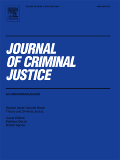
JOURNAL OF CRIMINAL JUSTICE
Elevating standards in interdisciplinary research.The JOURNAL OF CRIMINAL JUSTICE, published by Elsevier, stands at the forefront of interdisciplinary research at the nexus of law, psychology, and sociology. With an impressive impact factor and consistently ranking in the Q1 category across multiple disciplines, including Applied Psychology and Law, this journal serves as a vital platform for exploring critical issues in criminal justice policy, behavior, and system effectiveness. Since its inception in 1973, the journal has evolved its scope to encompass contemporary challenges and innovative responses within the field. Researchers, professionals, and students can benefit from access to high-quality, peer-reviewed articles that not only reflect current trends but also drive future discourse. Though currently not open access, the journal's rigorous standards ensure that all published works contribute significantly to advancing knowledge and practice in criminal justice and related areas.

Revista Brasileira de Direito Processual Penal
Advancing Legal Scholarship in Criminal ProcedureRevista Brasileira de Direito Processual Penal, published by the Instituto Brasileiro de Direito Processual Penal (IBRASPP), serves as a vital open-access platform for scholars and practitioners in the fields of criminal procedure law and social sciences. With an ISSN of 2359-3881 and an E-ISSN of 2525-510X, the journal has been committed to disseminating innovative legal research since its opening access in 2015, thus fostering engagement within legal academia. Based in Brazil and reaching an array of international contributors, it has achieved a respectable Q2 ranking in both Anthropology and Law categories as of 2023, appealing to a diverse audience interested in legal studies, sociology, and the interplay with mental health issues. The journal's ongoing commitment to excellence and impactful scholarship is reflected in its competitive standing across multiple Scopus ranks, making it a significant resource for researchers, legal professionals, and students looking to deepen their understanding of procedural law and its implications in contemporary society.
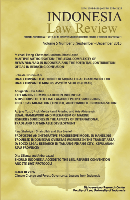
Indonesia Law Review
Advancing Legal Knowledge in Indonesia and BeyondIndonesia Law Review is a premier open-access academic journal dedicated to advancing knowledge in the fields of law and social sciences, with particular emphasis on the Indonesian legal landscape. Established by the Indonesian Law Review, this journal has made significant strides since becoming open access in 2014, ensuring that research is freely available to a global audience. Based in Depok, West Java, the journal seeks to foster scholarly discourse on legal issues pertinent to Indonesia, while also contributing to the broader field of education and social sciences. With its current Scopus rankings placing it within the top tiers of law and social sciences, including a Q3 categorization in law and a Q4 classification in education and miscellaneous social sciences, the **Indonesia Law Review** serves as a vital platform for researchers, professionals, and students to disseminate their findings and engage with contemporary legal dilemmas. The journal is committed to providing a robust forum for innovative legal scholarship and is an essential resource for anyone seeking to understand the complexities of law in Indonesia and beyond.
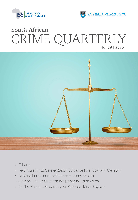
South African Crime Quarterly-SACQ
Championing research that informs and transforms justice systems.South African Crime Quarterly (SACQ) is an esteemed open-access journal dedicated to the comprehensive examination of crime and justice issues in South Africa. Published by the Institute for Security Studies, SACQ aims to provide a platform for researchers, practitioners, and policymakers to disseminate innovative research, case studies, and theoretical discussions that address the complexities of crime in the region. Since its transition to open access in 2015, the journal has fostered a wider dissemination of knowledge, promoting accessibility for students and professionals alike. With an ISSN of 1991-3877, SACQ stands out as an essential resource, driving informed dialogue and enhancing the understanding of security challenges in South Africa. The journal encourages submissions that contribute to evidence-based practices and policies, making it a vital tool for those committed to addressing crime and improving safety within communities.

Revista General de Derecho Penal
Cultivating critical dialogue on penal systems.Revista General de Derecho Penal, published by IUSTEL, is a premier academic journal dedicated to the dynamic field of criminal law. With an ISSN of 1698-1189, this journal serves as a crucial platform for researchers, legal professionals, and students to share their insights and findings related to penal law and its evolving applications in contemporary society. Although it is not an open access journal, it maintains high scholarly standards, helping to advance discourse in legal studies. The journal's address is C PRINCESA NO 29, 2A DCHA, MADRID 28008, SPAIN, positioning it within a vibrant academic community. With a focus on current legal challenges and theoretical advancements, Revista General de Derecho Penal plays an essential role in fostering understanding and developing effective legal frameworks in criminal justice, making it an invaluable resource for those engaged in the study and practice of law.
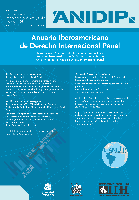
Anuario Iberoamericano de Derecho Internacional Penal
Advancing legal scholarship in the Ibero-American context.Anuario Iberoamericano de Derecho Internacional Penal is a distinguished open-access journal dedicated to the field of international criminal law, published by UNIV ROSARIO, EDITORIAL. Since its inception in 2013, this journal has provided a platform for rigorous research and scholarly discussions related to the complexities of international penal law, enhancing understanding and application across Ibero-American jurisdictions. With an ISSN of 2346-3120, it caters to an audience of researchers, legal practitioners, and students who are keen to explore contemporary issues, case law, and reforms within the realm of international criminal justice. The journal aims to foster interdisciplinary dialogue, promote legal scholarship, and contribute to the development of international law principles in the Spanish-speaking world. As an essential resource for those engaged in the study and practice of international law, Anuario Iberoamericano de Derecho Internacional Penal continues to uphold a commitment to accessibility and academic excellence.
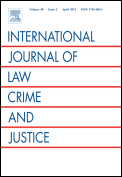
International Journal of Law Crime and Justice
Fostering Global Dialogue on Justice and Legal InnovationsThe International Journal of Law Crime and Justice, published by ELSEVIER SCI LTD, serves as a pivotal platform for the dissemination of cutting-edge research in the fields of law, crime, and justice. Established in 2008, the journal has established itself as a reputable source in its domain, holding a respectable Q2 ranking in Law, Political Science and International Relations, as well as Sociology and Political Science as of 2023. With an impact factor reflecting its influence, this journal ranks favorably within the top percentiles of Scopus in several social science categories, making it a critical resource for scholars and practitioners. The journal promotes open access, ensuring that vital research is accessible to a global audience. Scholars interested in the intricate intersection between legal studies, societal challenges, and crime will find the journal's objectives aligned with fostering knowledge and innovation in this dynamic field. Operating from its headquarters in London, England, the journal continues to invite substantial contributions that address contemporary issues and enhance our understanding of law and justice worldwide.

LEGAL AND CRIMINOLOGICAL PSYCHOLOGY
Bridging Psychology and Justice.LEGAL AND CRIMINOLOGICAL PSYCHOLOGY, published by WILEY, serves as a cornerstone in the interdisciplinary fields of criminal justice and psychological research. With an ISSN of 1355-3259 and an E-ISSN of 2044-8333, this journal has maintained a strong presence in academic discourse since its inception in 1996 and continues to publish vital research through 2024. Renowned for its rigorous approach, it ranks in the Q1 category for Pathology and Forensic Medicine and Q2 in Applied Psychology as of 2023, illustrating its pivotal role in advancing knowledge within these crucial areas. Researchers and practitioners benefit from the latest insights into the psychological facets of legal processes, with a Scopus rank that positions it among the top journals in both applied psychology (Rank #112/249) and pathology (Rank #71/208). The journal acts as an indispensable resource for those interested in the integration of psychological principles within legal frameworks, making it essential reading for academics, professionals, and students aiming to deepen their understanding of criminological psychology.
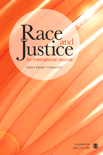
Race and Justice
Exploring the intersections of race and justice.Race and Justice is an esteemed academic journal published by SAGE Publications Inc, dedicated to advancing the discourse surrounding race and its complexities within the realms of justice, law, and sociopolitical dynamics. With its ISSN 2153-3687, the journal has positioned itself prominently in the Q1 category across multiple disciplines, including Anthropology, Law, and Sociology and Political Science. Since its inception in 2011, Race and Justice has become a vital resource for researchers, professionals, and students, offering rigorous peer-reviewed articles that explore critical issues related to race and systemic justice. It boasts impressive Scopus rankings, placing it in the 96th percentile for Anthropology and the 95th percentile for Law, highlighting its significant impact in the social sciences. This journal not only fosters scholarly inquiry but also encourages critical dialogue on the implications of racial issues in the justice system. Although it is not an open-access journal, its comprehensive scope and high standards make it indispensable for anyone engaged in the study of race and justice.